Biz/Ed Bulletin: What Do You Want to Know?
Introducing the Advice and Answers Section of the CTI Economics Web site
The CTI centre for Economics [1]is part of a national initiative encouraging and promoting the appropriate use of learning technologies in UK Higher Education. It is based at the Institute for Learning and Research Technology (ILRT)[2]at the University of Bristol. The CTI Economics Web site has long provided academic Economists with resource catalogues that give value-added information on topics such as where to find on-line data, what software exists to teach Macroeconomics and how Java is being used in online tutorials. Recently however, we have taken the decision to focus even more on answering many of our user’s common questions with a new Advice section [3].
This new section stemmed from the creation of twelve primers by staff among the 24 CTI centres and hosted on the CTI Web site [4] . These primers are intended to provide a brief introduction to a range of technology and learning issues. They have been written to help academics understand the new technologies available and integrate them effectively into their courses, with the emphasis on active and student-centred learning.
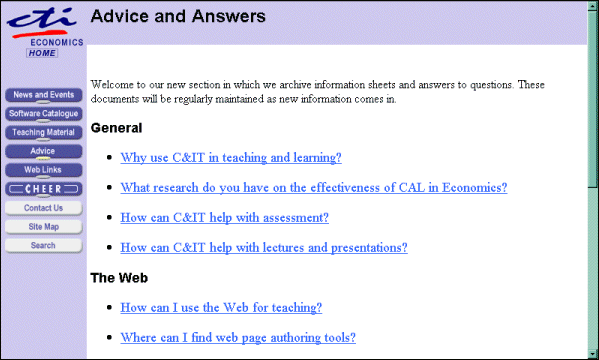
Figure 1: Advice and Answers section
We have taken some of these primers, adapted them to enhance their relevance to our particular community and begun to author our own versions. Currently the section includes thirteen documents ranging from how to put mathematical symbols and expressions into Web pages to the use of computers in giving lectures and presentations. They consist of short articles, intending only as starting points, that address particular questions and link to further reading. Like other parts of the site, these articles will be frequently maintained, with extra relevant links and advice being added as the centre receives them. We hope that they will make academic Economists better able to make course Web pages, write assessment and revision questions, give computer-based presentations or integrate e-mail discussion into their teaching, amongst numerous other skills.
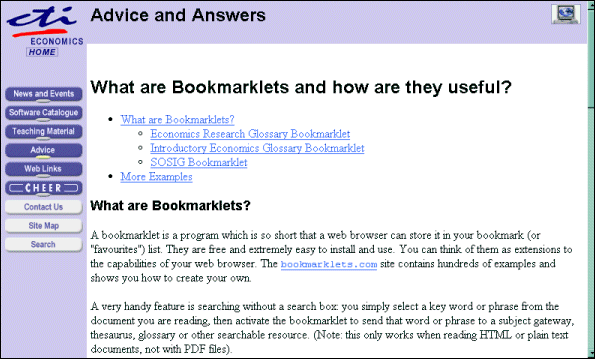
Figure 2: Example article
The section is still new and we hope to build up a store of advice sheets, tailored for the Economic academic community. We are looking for suggestions as to other advice sheets that we could include. Please let us know if you have any ideas.
References
- CTI Economics Web site, Home page
<URL: http://www.ilrt.ac.uk/ctiecon/> - Institute for Learning and Research Technology, Home Page
<URL: http://www.ilrt.bris.ac.uk> - CTI Economics Web site, Advice and Answers section
<URL: http://www.ilrt.bris.ac.uk/ctiecon/advice.htm> - CTI Web site, CTI Primers
<URL: http://www.cti.ac.uk/publ/primers/>
Author Details
Chris Mitchell
ILRT
University of Bristol
8-10 Berkeley Square
Bristol, BS8 1HH
University of Bristol
Email: chris.mitchell@bristol.ac.uk
Web site: http://www.ilrt.bris.ac.uk/about/staff/chrismitchell.html
Martin Poulter
ILRT
University of Bristol
8-10 Berkeley Square
Bristol, BS8 1HH
University of Bristol
Email: m.l.poulter@bristol.ac.uk
Web site: http://www.ilrt.bris.ac.uk/about/staff/martinp.html
Green Resources on the Web for Economics and Business
There are two new sub-sections in the Biz/ed Internet Catalogue. ‘Environmental Economics’ and ‘Business and the Environment’ have been added as the number of high quality Web sites surrounding sustainable development and green issues has increased. We have expanded the classification scheme to include these two areas and they will appear on the new browse screen when it is developed later in the year.
Here I introduce some key Web sites in these new disciplines as well as recommending some from the existing ‘Eco-tourism’ section of the Internet Catalogue. This is a rapidly expanding field, as an ever-increasing number of charitable and non-profit organisations are using the Internet to publicise their campaigns and research.
You can find all of the following resources in the Biz/ed Internet Catalogue [1].
Environmental Economics
The Environmental Economics and Indicators Unit [2] of the World Bank’s Environment Family was formed at the end of 1995 to serve as a focal point for two important areas of applied environmental economics: “new thinking on measuring the environment, and focused application of best practice on valuing the environment.” There are sections on environmental indicators, trade and the environment, green accounting, environmental policy and environmental evaluation. This is a useful resource as it is possible to download full papers and reports published by the department in PDF format.
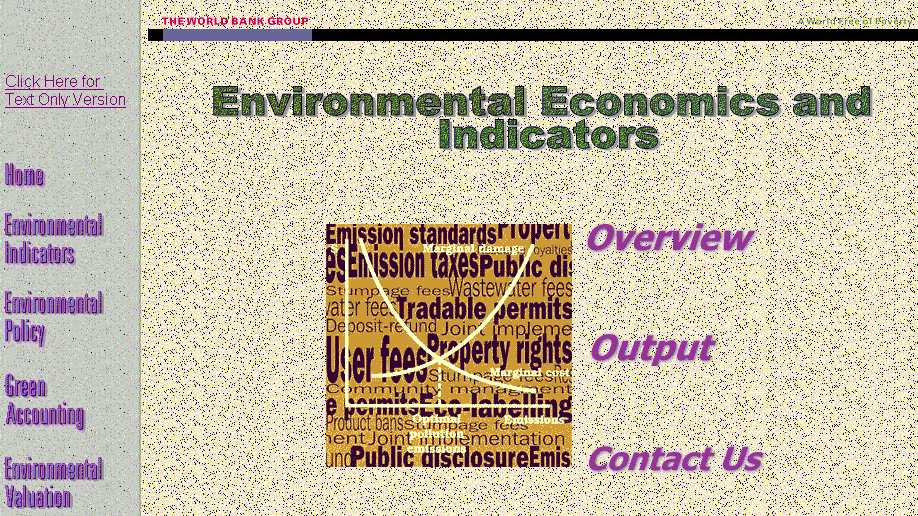
Figure 1: World Bank Environmental Economics and Indicators Unit Homepage
ABARE (Australian Bureau of Agricultural and Resource Economics) [3] is the largest applied economic research agency in Australia, with more than fifty years experience. The organisation undertakes economic research and policy analysis of issues relating to minerals, energy, agriculture, forestry, fisheries, trade and the environment. ABARE provides consulting and information services to a variety of industry groups, Australian and international agencies, research organisations, and governments. The publication ‘Current Issues’ contains short reports on topical issues and can be read online with the aid of Adobe Acrobat. There are also details about research and publications produced by the agency.
The Ecol-Econ [4] discussion list, hosted by the Communications for a Sustainable Future, enables discussion around alternatives to the prevailing economic paradigms. It addresses such issues as sustainability, the role of economic growth, free trade and the environment, and the role of multilateral economic institutions in the sustainability of the development process. The messages have been archived since April 1994. The site also provides the full text of essays from some of the members of the mailing list and some links to related sources of information.
The Environmental Economics Working Paper Inventory [5] is intended as a service to environmental economists and others interested in the economics of environmental pollution control. Their goal is “to provide a convenient location for almost immediate publication of new working papers and easy access to existing ones. This site is run by the United States government’s Independent Environment Protection Agency (EPA) as a service to those interested in environmental economics. It contains a database of working papers on environmental economics and pollution. The database contains title, author(s), subject, keywords, date authored, date submitted, whether presented at conferences, an abstract, and a link to a web-accessible version of the paper if one exists (many do). There are some author profiles, but not every author fills them in. There is no peer review: the papers are self-submitted. Many papers referred to are in PDF. The site uses frames.
Sustainable Business
The United Nations Department for Economic and Social Development [6] Web site is divided into areas of interest including trade, sustainable development and environment. From the homepage follow the link to ‘Research’ for papers on development studies, statistics, models and forecasts which can be read using Adobe Acrobat. There are also links to United Nations Development programme and the Economic and Social Council.
OneWorld Online [7]is dedicated to promoting human rights and sustainable development by harnessing the democratic potential of the Internet. This set of resource guides brings together material from all over the world to give an introduction to subjects such as tourism, ethical consumers and fair trade. Links to external resources and commentaries are provided in addition to information and news provided by each guides author. This is an interesting resource as due to its wide range of supporting partners (over 260 organisations in this Internet community). The site uses frames.
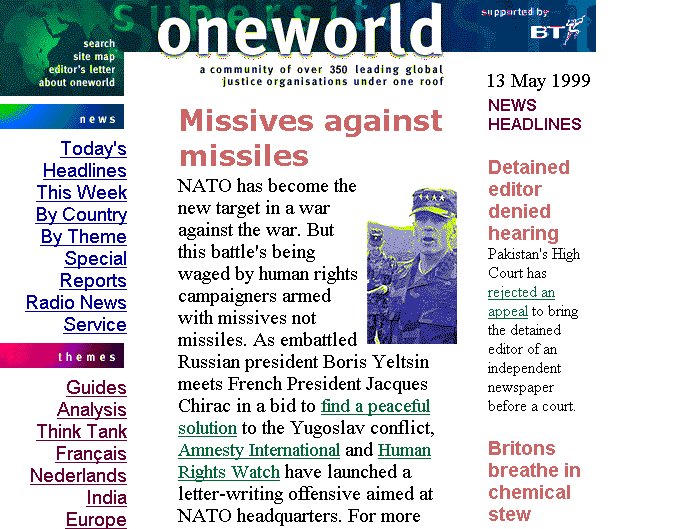
Figure 2: OneWorld Online Homepage
business-ethics [8] is a mailbase list which seeks to “facilitate debate and discussion activities between the members of the academic, research, business communities and other parties who are interested in the systematic study or practical investigation of the ethical issues facing business and industry.” The list was first launched in June 1998.
SustainAbility [9] is an award-winning British strategic management consultancy and think-tank. Founded in 1987, they are “dedicated to promoting the business case for sustainable development” of which their three main areas of operation are: foresight, agenda-setting and change management. The SustainAbility mission is “to help create a more sustainable world by encouraging the evolution and widespread adoption of thinking and practices which are socially responsible, environmentally sound, and economically viable.” This Web site contains consultation papers, working papers, monthly reviews and key events relating to sustainable development. There are also articles written by members of the company that have appeared in The Guardian, Resurgence and Tomorrow.
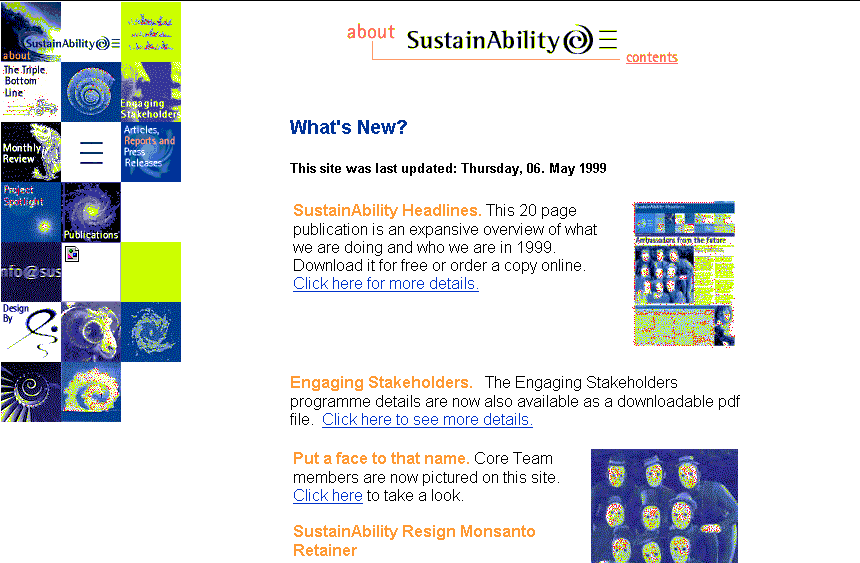
Figure 3: SustainAbility Homepage
The Sustainable Business Network [10]is a resource guide which includes an extensive list of university departments and research organisations devoted to sustainable aspects of business. There are also links to periodicals, reports, databases, directories and organisations. Its mission is to “promote the growth and development of environmentally and socially responsible businesses, providing the tools and information necessary to make sustainable business a prominent global economic force.” There are also listings for people interested in becoming partners or investors in sustainable business projects.
Resources for the Future [11] is a non-profit and non-partisan think tank located in Washington, DC that conducts independent research, rooted primarily in economics and other social sciences, on environmental and natural resource issues. Research is split into the following areas: Methods, Tools and Techniques; Environmental; Natural resources and Intersections. Under the ‘Intersections’ heading you will find resources on sustainable development and urban transportation and in the ‘Methods, Tools and Techniques’ section there are papers etc. on cost benefit analysis, risk and modelling. The Web site holds discussion papers, works in progress, summaries of projects and reports. You can search the inventory by title, author, subject, institution or media.
Eco-Tourism
The primary objectives of the International Centre for Integrated Mountain Development (ICIMOD) [12] are to “help promote the development of an economically and environmentally sound mountain ecosystem and to improve the living standards of mountain populations”, especially in the Hindu Kush-Himalayan Region (HKH). ICIMOD is the first international organization to make a commitment to improve the livelihoods of mountain communities, helping them to live and not merely exist upon the highest wonders on earth. This Web site provides a specific case study of sustainable mountain tourism. On this page you will find statistics on tourism in Nepal and the importance of tourism to the economy. There are guidelines on best practices for eco-tourism and promising examples of sustainable mountain tourism.
Eco-Source [13] provides information and services regarding eco-tourism and sustainable development. Established in October 1995, by professionals and individuals interested in helping the Travel and Tourism industry become sustainable this Web site includes eco-tourism facts and statistics in the Environmental Education section.
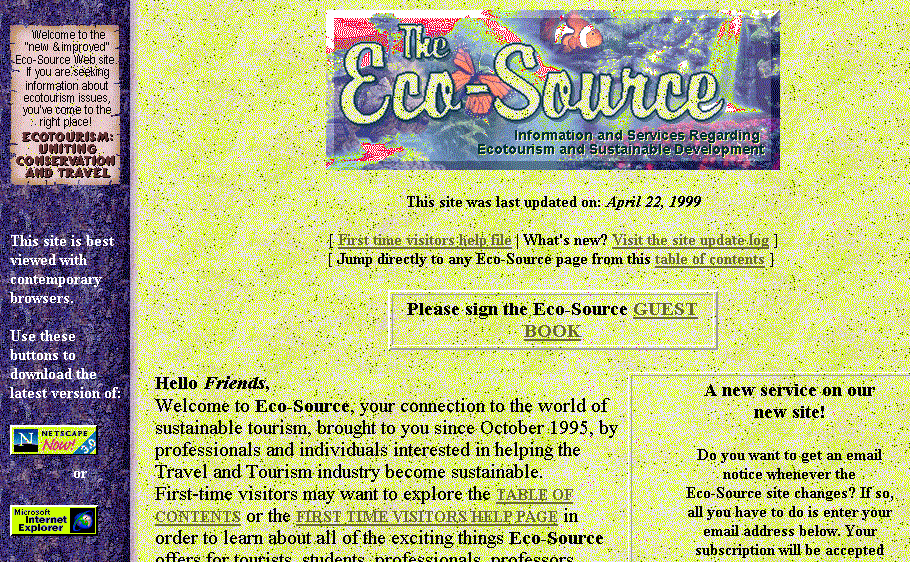
Figure 4: Eco-Source Homepage
The CAFOD [14] Web site includes a number pages devoted to ‘Youth Topics’ surrounding ethical and environmental issues. The ‘Holidays - Poverty or Paradise?’ is divided into four activities with supporting materials to provide the context of the issue surrounding eco-tourism. There are case studies, examining the image of tourism, facts about who travels where. Also included are tourism issues to consider in an imaginary third world country, role-play’s and questions intended to provoke discussion amongst classes.
ECoNETT [15] is a joint project between the World Travel & Tourism Council and the European Commission to develop an information network for tourism and the environment. ECoNETT aims to increase overall awareness of sustainable travel & tourism and in turn stimulate changes in management practices, in destinations and corporations to achieve sustainable travel & tourism development. This site gives a comprehensive coverage of sustainable tourism initiatives as well as providing contacts and links to other sources. Full text searching of the site is possible and links to related sites are provided. Some information is given in Spanish, French, Dutch and Italian.
References
[1] Biz/ed Internet Catalogue
http://www.bized.ac.uk/listserv/listhome.htm
[2]World Bank Environmental Economics and Indicators
http://www-esd.worldbank.org/eei/
[3]ABARE - Australian Bureau of Agricultural and Resource Economics
http://www.abare.gov.au/
[4]Communications for a Sustainable Future
http://csf.colorado.edu/ecol-econ/
[5]Environmental Economics Working Paper Inventory
http://206.29.48.66/EPA/wpi.nsf/
[6]United Nations Department of Economics and Social Development
http://www.un.org/esa/index.html
[7]OneWorld Online
http://www.oneworld.org/guides/
[8]business-ethics
http://www.mailbase.ac.uk/lists/business-ethics/
[9]SustainAbility
http://www.sustainability.co.uk/
[10]Sustainable Business Network
http://sbn.envirolink.org/
[11]Resources for the Future
http://www.rff.org/
[12]International Centre for Integrated Mountain Development
http://www.icimod.org.sg/focus/tourism/mtour_toc.htm
[13]Eco-Source
http://www.podi.com/ecosource/
[14]CAFOD - Holidays: Poverty or Paradise?
http://www.cafod.org.uk/holidays.htm
[15]ECoNETT
http://www.wttc.org/
Author Details
Kate Sharp, Research Officer
ILRT
University of Bristol
8-10 Berkeley Square
Bristol, BS8 1HH
Email: kate.sharp@bristol.ac.uk
Web site: http://www.ilrt.bris.ac.uk/about/staff/kates.html
